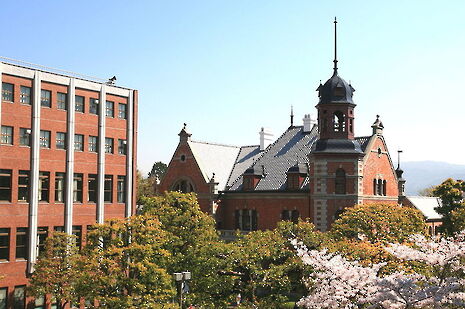Land of the Rising Sun: Being a foreigner in Japan
In her final column, Anna Ellis-Rees explores the role of foreigners in Japanese society and what year abroad students should take away from their experiences

As a nation, Britain prides itself on its multiculturalism. We like to think of ourselves as a country that discourages hostility, and that welcomes foreigners with open arms, even though the reality is a far cry from this image. Take Home Secretary Amber Rudd for example, who recently announced restrictions for international students through a so-called ‘controlling migration fund’. What we rarely stop to think about is how foreigners actually feel about their place in society, and on the occasion that they are asked, unsurprisingly the answer tends to differ from our patriotic expectations.
This denial continues with the floods of young Britons who fly abroad to ‘find’ themselves in developing countries, and return claiming they bravely overcame the so-called struggles they faced during their onetime experience as an ethnic minority. On their Facebook posts and blogs they lament about their new understanding of what discrimination feels like. Considering the context of racial history, this is not only an offensive statement but just plain wrong.
Before my arrival in Japan, I was warned frequently of the immense culture shock I would face. While I have certainly had some stressful experiences, I refuse to talk of my experiences, good and bad, in parallel to the comparatively historically-loaded difficulties that non-white foreigners receive in the UK and around the world. In spite of this mindset, the life of a foreigner is an interesting aspect of Japan’s complex social structures.
"Attitudes towards foreigners in Japan are a mixture of indifference and fascination depending on the situation."
Attitudes towards foreigners in Japan are a mixture of indifference and fascination depending on the situation. This is to be expected of any country, but it is how these feelings are presented that is interesting. Considering indifference first, despite what Western visitors are told before they come to Japan, they probably won’t be the subject of intense staring when walking down a street in Kyoto, a major tourist centre. To expect that you will is ignorant; a ‘West-o-centric’ mindset leads some tourists to expect some kind of appreciation for the colour of their skin, as if it is the first time a non-Japanese person has been seen in Kyoto, or as if television and internet didn’t exist.
Japan is a relatively homogenous nation with a low level of immigration, and in some ways this shows up in sociological terms. For example, the term minzoku, ‘ethnic group’, does not distinguish between national, racial and ethnic groups. Even so, it is bordering on supremacy to believe that white people are at the centre of every Japanese person’s interests. The fact that for the most part foreigners seem not to be given a second thought perhaps shows that there is more awareness of the outside world than everyone makes out.
However, the major difficulty is making Japanese friends, commonly known to be a great challenge for foreign students or expats. When asked why they think it is so hard, the majority of the Japanese students I interviewed at Doshisha University said that there were a lack of opportunities to meet foreigners; this is somewhat unconvincing considering the numerous international events that take place. The response that made more sense was the frequently heard statement: ‘Japanese people are shy.’ This doesn’t mean that Japanese social lives are vastly different from the ones we are familiar with, but it does explain the extra layer of complexity within these circles.

The famous Japanese politeness, rooted in tatemae (one’s social façade) and honne (one’s true feelings), is perhaps akin to this shyness; many Japanese students said that they did not want to imposition a foreign student by approaching them in case they didn’t understand Japanese. From a different cultural perspective, this lack of contact can be interpreted, ironically, as impolite. While from a Japanese viewpoint not handing a flyer written in complicated characters to a foreign student when they pass by may be seen as considerate, for the foreign student it is somewhat alienating and generates the feeling that they cannot properly interact with anyone outside of the exchange programme.
We should bear this in mind when remarking that international students only interact with each other. Cultural differences and language barriers do exist, and while in an ideal world this shouldn’t prevent smooth interactions between home and foreign students, there is no doubt that it can have an impact.
“The famous Japanese politeness, rooted in tatemae (one’s social façade) and honne (one’s true feelings), is perhaps akin to this shyness.”
On the other hand, as opposed to indifference, at times reactions to foreigners in Japan are ones of fascination. Unlike riding a train or going shopping, more intimate or personal interactions display the excitement that some Japanese people, often young girls, experience around foreigners. When given a chance to actually approach them, Japanese people often seem pleased or excited to talk with foreigners, particularly if they can speak some of their mother tongue.
Perhaps the barrier between Japanese and non-Japanese people is in fact due to the lack of opportunities given, as the aforementioned students said. But instead of the meet-and-greet or language exchange opportunities that I originally thought they were talking about, maybe what they really meant were opportunities where it is socially acceptable to take off the mask of tatemae and, by showing an interest and taking genuine pleasure out of interacting with foreigners, display honne. This may explain the difference in reaction between walking around university campus and spending Halloween in the busy streets of Namba, where many keenly approached and asked for pictures with the foreign group I was with.
And yet can this be seen as somewhat troubling? If non-Japanese were more assimilated into Japanese society, perhaps there would be some kind of middle ground for foreigners, and the barrier between international and non-international students would break down.
British students on their year abroad should take more from their experiences than tourist souvenirs and grammar exercises. They should think about the background behind the difficulties they face and in turn consider the lives of the international students they may know at their home universities. After the initial struggle of getting over culture shock, the small bout of loneliness and alienation students experience on their year abroad should make them consider how much worse life must be for certain foreigners in Britain, where their background may well not work in their favour.
While we may believe that we treat foreigners in a way that allows them to participate in British society, we should not always assume it to be true. The question that remains is: why are we not listening to the foreigners themselves and giving them a voice? This is how we can begin to make their new lives in the UK more comfortable.
 News / Eight Cambridge researchers awarded €17m in ERC research grants27 December 2025
News / Eight Cambridge researchers awarded €17m in ERC research grants27 December 2025 News / Downing investigates ‘mysterious’ underground burial vault 29 December 2025
News / Downing investigates ‘mysterious’ underground burial vault 29 December 2025 Lifestyle / Ask Auntie Alice29 December 2025
Lifestyle / Ask Auntie Alice29 December 2025 Sport / Hard work, heartbreak and hope: international gymnast Maddie Marshall’s journey 29 December 2025
Sport / Hard work, heartbreak and hope: international gymnast Maddie Marshall’s journey 29 December 2025 News / News in Brief: carols, card games, and canine calamities28 December 2025
News / News in Brief: carols, card games, and canine calamities28 December 2025







